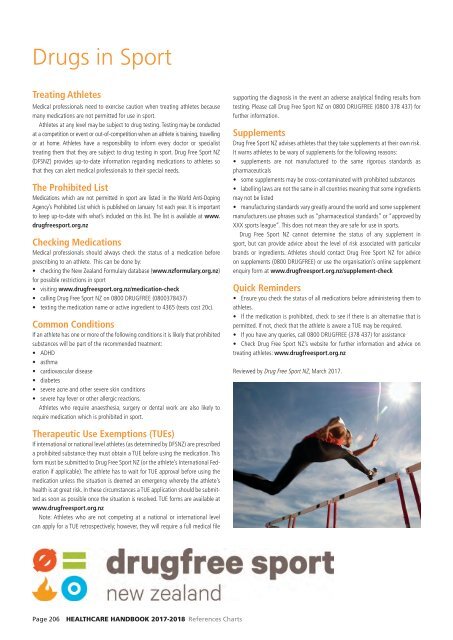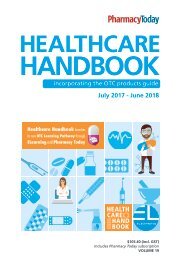2017 HCHB_digital
You also want an ePaper? Increase the reach of your titles
YUMPU automatically turns print PDFs into web optimized ePapers that Google loves.
Drugs in Sport<br />
Treating Athletes<br />
Medical professionals need to exercise caution when treating athletes because<br />
many medications are not permitted for use in sport.<br />
Athletes at any level may be subject to drug testing. Testing may be conducted<br />
at a competition or event or out-of-competition when an athlete is training, travelling<br />
or at home. Athletes have a responsibility to inform every doctor or specialist<br />
treating them that they are subject to drug testing in sport. Drug Free Sport NZ<br />
(DFSNZ) provides up-to-date information regarding medications to athletes so<br />
that they can alert medical professionals to their special needs.<br />
The Prohibited List<br />
Medications which are not permitted in sport are listed in the World Anti-Doping<br />
Agency’s Prohibited List which is published on January 1st each year. It is important<br />
to keep up-to-date with what’s included on this list. The list is available at www.<br />
drugfreesport.org.nz<br />
Checking Medications<br />
Medical professionals should always check the status of a medication before<br />
prescribing to an athlete. This can be done by:<br />
••<br />
checking the New Zealand Formulary database (www.nzformulary.org.nz)<br />
for possible restrictions in sport<br />
••<br />
visiting www.drugfreesport.org.nz/medication-check<br />
••<br />
calling Drug Free Sport NZ on 0800 DRUGFREE (0800378437)<br />
••<br />
texting the medication name or active ingredient to 4365 (texts cost 20c).<br />
Common Conditions<br />
If an athlete has one or more of the following conditions it is likely that prohibited<br />
substances will be part of the recommended treatment:<br />
••<br />
ADHD<br />
••<br />
asthma<br />
••<br />
cardiovascular disease<br />
••<br />
diabetes<br />
••<br />
severe acne and other severe skin conditions<br />
••<br />
severe hay fever or other allergic reactions.<br />
Athletes who require anaesthesia, surgery or dental work are also likely to<br />
require medication which is prohibited in sport.<br />
supporting the diagnosis in the event an adverse analytical finding results from<br />
testing. Please call Drug Free Sport NZ on 0800 DRUGFREE (0800 378 437) for<br />
further information.<br />
Supplements<br />
Drug Free Sport NZ advises athletes that they take supplements at their own risk.<br />
It warns athletes to be wary of supplements for the following reasons:<br />
••<br />
supplements are not manufactured to the same rigorous standards as<br />
pharmaceuticals<br />
••<br />
some supplements may be cross-contaminated with prohibited substances<br />
••<br />
labelling laws are not the same in all countries meaning that some ingredients<br />
may not be listed<br />
••<br />
manufacturing standards vary greatly around the world and some supplement<br />
manufacturers use phrases such as “pharmaceutical standards” or “approved by<br />
XXX sports league”. This does not mean they are safe for use in sports.<br />
Drug Free Sport NZ cannot determine the status of any supplement in<br />
sport, but can provide advice about the level of risk associated with particular<br />
brands or ingredients. Athletes should contact Drug Free Sport NZ for advice<br />
on supplements (0800 DRUGFREE) or use the organisation’s online supplement<br />
enquiry form at www.drugfreesport.org.nz/supplement-check<br />
Quick Reminders<br />
••<br />
Ensure you check the status of all medications before administering them to<br />
athletes.<br />
••<br />
If the medication is prohibited, check to see if there is an alternative that is<br />
permitted. If not, check that the athlete is aware a TUE may be required.<br />
••<br />
If you have any queries, call 0800 DRUGFREE (378 437) for assistance<br />
••<br />
Check Drug Free Sport NZ’s website for further information and advice on<br />
treating athletes: www.drugfreesport.org.nz<br />
Reviewed by Drug Free Sport NZ, March <strong>2017</strong>.<br />
Therapeutic Use Exemptions (TUEs)<br />
If international or national level athletes (as determined by DFSNZ) are prescribed<br />
a prohibited substance they must obtain a TUE before using the medication. This<br />
form must be submitted to Drug Free Sport NZ (or the athlete’s International Federation<br />
if applicable). The athlete has to wait for TUE approval before using the<br />
medication unless the situation is deemed an emergency whereby the athlete’s<br />
health is at great risk. In these circumstances a TUE application should be submitted<br />
as soon as possible once the situation is resolved. TUE forms are available at<br />
www.drugfreesport.org.nz<br />
Note: Athletes who are not competing at a national or international level<br />
can apply for a TUE retrospectively; however, they will require a full medical file<br />
Page 206 HEALTHCARE HANDBOOK <strong>2017</strong>-2018 References Charts



